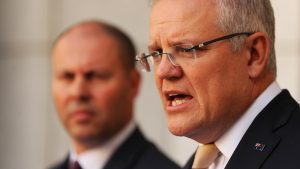Australia’s most senior intelligence and security official, the director general of security, Mike Burgess, made the rare step last week of appearing on Australia’s flagship current affairs program, the 7.30 Report.
Dominating the segment was national security ahead of the next federal election, likely to be held sometime in May of this year.
Responding to the host’s question of how concerned he is about politicians weaponizing national security and intelligence in the lead-up to the election, Burgess’ was careful with his words, but his overall message was clear.
“ASIO [Australian Security Intelligence Organisation] is apolitical, my staff are apolitical. They put their lives on the line to actually protect Australians and Australia from threats of security,” he said.
“The act, the ASIO Act requires us to be apolitical. I take that very seriously. So, I’ll leave the politics to the politicians but I’m very clear with everyone that I need to be, that’s not helpful for us.”
Burgess’ TV interview came just days after he gave the Australian Senate a similar warning: “I take our reputation very seriously. ASIO is not here to be politicized. It should not be.”
Burgess’ forthright intervention followed comments from Australian Defense Minister Peter Dutton, who claimed the Chinese government had picked the leader of the opposition, Anthony Albanese, “as their candidate.”
Prime Minister Scott Morrison jumped on board, accusing the deputy opposition leader, Richard Marles, of being the “Manchurian candidate,” a reference to the famous book and film of the same title, in which the son of a prominent family is brainwashed into spreading communism.
Using national security to win over voters ahead of an election is a tried and tested strategy for Morrison’s party, but he’s banging the national security drum more furiously than before as he slumps in the polls.
Despite Burgess stating that there was no basis for Dutton and Morrison’s accusations and that their party is at the same risk of being infiltrated as the opposition, conservative media has continued to ramp up the attacks.
The Rupert Murdoch-owned News Corp has published more than a dozen articles attempting to link Albanese and the opposition party to the Chinese Communist Party, but have had to look far and wide – including in the history books.
One article is based entirely on Albanese attending a forum hosted by a magazine associated with the Communist Party of Australia 31 years ago, when he was just 28 years old.
The attack had an unintended effect though, as Australians pointed out that members of Morrison’s own government had more recently engaged in such events. The Communist Party of Australia even mocked the article: “Stop trying to make [Albanese] seem based and cool, it’s never going to happen.”
The Daily Mail ran an article titled “How Anthony Albanese was close to communists but now hoping to be Australian Prime Minister.”
Another article, titled “Albanese caught speaking Chinese” appears to imply some sort of complicity. Not that an Australian leader should need permission to say a few words in the second most dominant language spoken in Australia after English, but Albanese responded to the article stating that he’d received the green light from ASIO before giving the speech.
While Australia-China relations have become incredibly strained in recent years, it appears the Morrison government and conservative media have forgotten that China has long been one of Australia’s most important trade partners – and will continue to be for years to come.
That doesn’t mean China shouldn’t be held to account for abuses committed at home or attempts
to influence internal affairs in Australia. But an Australian leader saying a few words in Mandarin is
hardly the crime Morrison would like Australians to believe it is. With Morrison’s hopes of a
second term fading fast, this is likely just the beginning of Morrison’s China scare campaign, no
matter the risk to Australian national security or the two countries already frail relationship.

































